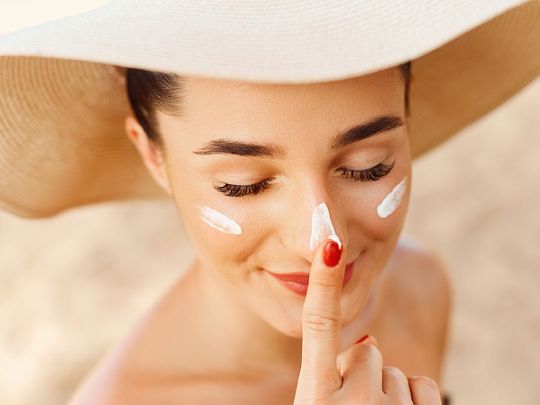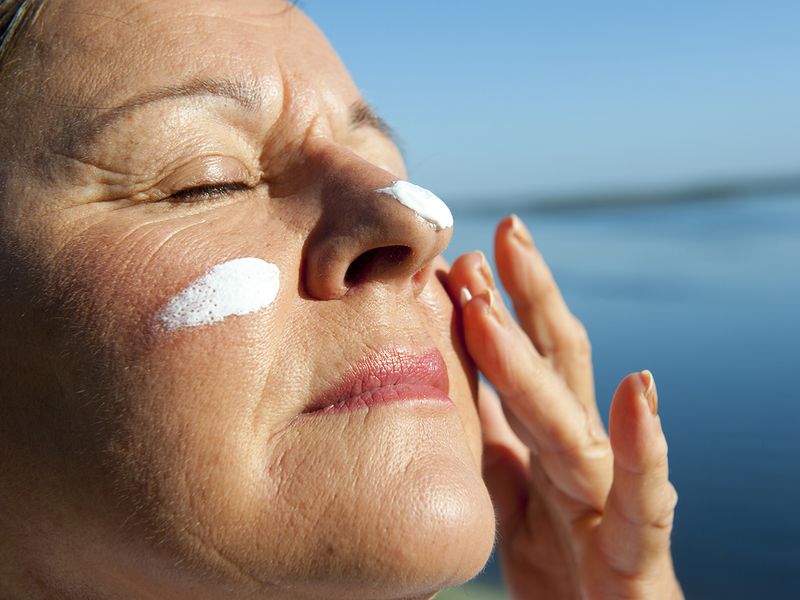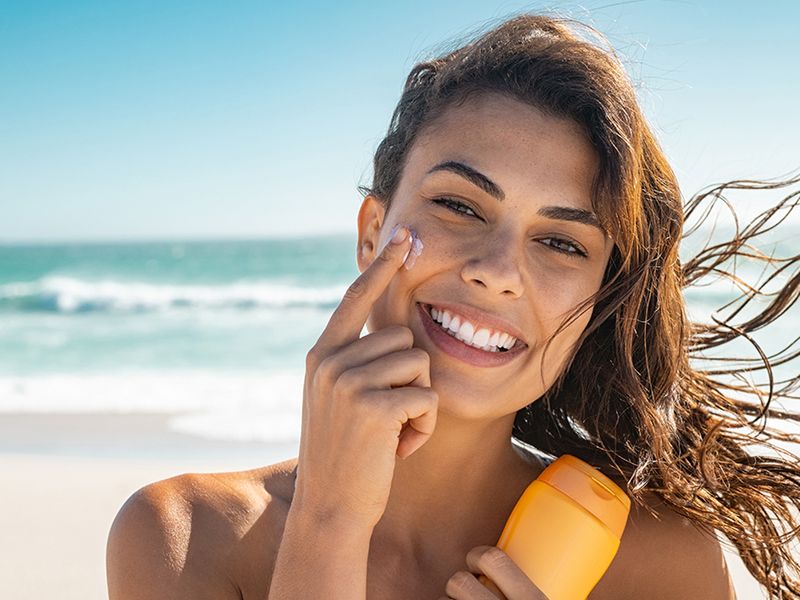
The sun is out, and so are the hats, oversized sunglasses, and most importantly, sunscreens. Whether you’re exercising outdoors or just heading to work, it’s vital to make sun protection part of your skincare routine in the summer.
But as the temperature climbs higher, simply patting on moisturisers that contain SPF (sun protection factor) 30 may not be enough. If you’re looking to prevent wrinkles, sun spots, and acne scarring, it’s worth investing in a solid sunscreen for the face.
Do I need a separate sunscreen for the face?

At home, you likely already have a tube or bottle of sunscreen that you apply all over your arms and legs. But would it be suitable for the face? Dr Anna Zakhozha, specialist dermatologist at Hortman Clinic Dubai, clarified: “Technically, we can use body sunscreens on our face, but they are usually formulated with different ingredients that may irritate the facial skin.”
Facial sunscreens, on the other hand, take into consideration the delicate skin under the eyes, and sensitivity concerns, so they’re usually formulated with ingredients that are gentle on the skin. Without the different formulations for various skin types, those with acne, an oily T-zone and general sensitivity could become wary of the greasy, and potentially, pore-clogging layer.
"Facial sunscreen is non-comedogenic, lightweight and can be tinted, so as not to leave behind a white residue. It's more aesthetically acceptable and is formulated for dry, sensitive or oily skin types," said Dr Mayur Bhobe, a specialist dermatologist in aesthetics at the CosmeSurge Hospital in Dubai. "Sunscreen application is an easy way to prevent many skin conditions and disorders, saving you a lot of time and effort in the future."
When picking up a facial sunscreen, Dr Zakhozha recommends choosing one with SPF 50, since it's best suited to UAE’s hot climate. She also advised looking for sunscreens that protect against ultraviolet-B (UVB) and ultraviolet-A (UVA) rays. While the first is responsible for sunburn, and in extreme cases, skin cancer, the second causes premature skin ageing and wrinkle formation.
Dr Akreti Sobti, a Dubai-based special dermatologist, calls sunscreen your best antiageing tool. "Sunscreen starts in childhood - it's not exclusive to adults. From the age of 10, your skin is already taking sun damage, which surfaces later on in life. It's extremely important that kids wear sunscreen, too," she said.
Which sunscreen is the best for me?

Choosing the right sunscreen boils down to your skin type and cosmetic preferences. It'll be helpful to know the difference between the two types of filters before you settle on a product. These are mineral (or physical) and chemical sunscreens.
"Titanium dioxide and zinc oxide in mineral sunscreen reflect the light away from the skin, but leave a white cast and make the product difficult to spread on the skin. People with sensitive skin go for physical sunscreen, and you'll often see those who play sports under the sun, like tennis players and cricketers, wearing it," said Dr Sobti.
True to its name, mineral filters create a physical barrier against a broad spectrum of light, including UVA, UVB and visible light, adds Dr Bhobe. In terms of ease of use and visibility, chemical filters are more aesthetically pleasing for being lightweight and leaving behind no residue for deeper skin tones. This is because a set of chemicals absorbs the light instead of reflecting it. But, make sure to apply a chemical-based sunscreen 15 to 20 minutes before stepping out.
Both experts agree that physical sunscreen is a safer and better choice. However, there are sun blockers that come in a hybrid formulation, offering users the best of both worlds - broad-spectrum protection and no chalky cast. Dr Bhobe suggests tinted sunscreens if you wear makeup, to reduce product layering.
Also, when shopping for sunscreens, look for the letters ‘PA’, which stand for ‘protection grade of UVA’, followed by plus signs (for instance, PA+ signifies some protection, while PA++++ signifies the highest level of protection).
Once you’ve selected your sunscreen and are ready to apply it, make sure you’re using enough. Dr Zakhozha advised squeezing it onto the length of two fingers: “Two fingers’ worth is enough quantity for the full face. But if you are applying less, it’s not enough to provide your facial skin with complete protection.”
Thanks to our experts' guidance, and top-rated user reviews, we found the best facial sunscreens for you to get this summer. Pick up your favourite with Prime, and head outdoors, protected and ready to seize the day.
1. Best Overall: Cosrx Aloe Soothing Sun Cream (SPF 50, PA+++)
Korean skincare brand Cosrx’s daily soothing sunblock is so beloved, it has close to 15,000 4.5-star reviews on Amazon. Lightweight, with the feel of a moisturiser, the sun cream is formulated with aloe arborescens leaf extract, which soothes irritation and evens out the complexion. The formula is also free of oxybenzone, a controversial ingredient that’s often used in sunscreens, but has been shown to have negative effects on people’s health and the environment. Reviewers say the sun cream quickly absorbs into the skin without leaving a white cast. However, those with oily skin mention that they need to limit usage or couple it with foundation, since their faces tend to take on a greasy sheen with too much sun cream.
2. Best for Oily Skin: eltaMD UV Physical Broadband (SPF 41)
As Dr Zakhozha’s top recommendation for oily and sensitive skin, eltaMD’s formula is lightweight, chemical- and oil-free, so it doesn’t clog pores. The Swiss brand’s mineral sunscreen uses antioxidants to neutralise free radicals, which are responsible for ageing the skin, and it’s formulated with zinc oxide and titanium dioxide to protect against harmful UVA and UVB rays. Reviewers like that it’s lightly tinted, and leaves a matte finish – perfect for people struggling with oily T-zones. The sunscreen is water-resistant for up to 40 minutes, and holds up well against humidity and perspiration, but you’ll need to top it up if you’re outdoors for longer.
3. Best Hybrid Sunscreen: ISDIN Fotoprotector Fusion Water (SPF 50+)
Enjoy the benefits of both physical and chemical filters in this recommendation by Dr Bhobe. The Isdin Fotoprotector Fusion Water sunscreen has an oil-free, water-based formula that offers a high protection of SPF 50+. Its thin texture doesn't clog pores or cause any eye irritation. With hyaluronic acid and vitamin E, expect its antiageing and antioxidant properties to give your skin an extra boost. Plus, whether you're headed to the pool or beach this summer, the Fusion Water SPF wears easily on wet skin as it does on dry skin, so reapplication is always encouraged. Just make sure to have it on 30 minutes prior to sun exposure.
4. Best for Acne-Prone Skin: Eucerin Sun Oil Control Gel-Cream (SPF 50+)
Eucerin's sun gel-cream with oil control sits on Dr Sobti's vanity. Her personal choice of sunscreen is perfect for her acne- and oily-prone skin, since its free of fragrance and non-comedogenic. Lipid-absorbing micro pigments take away any greasy aftermath for a dry-touch finish. The best part about this sunblock is that it not only shields the face against UVA and UVB rays but visible light, as well, which can exacerbate ageing and pigmentation. Despite having chemical filters, Eucerin states that there's no waiting time required after application. Reviewers attest to no stickiness or oily appearance once used, even working brilliantly under makeup without pilling.
5. Best for Dry Skin: Anessa Perfect UV Sunscreen Skincare Milk (SPF 50)
Many sunscreens can dry out the face, leaving your skin feeling dehydrated and flaky. Reviewers say they’ve immediately noticed a difference with Anessa’s sunscreen milk – it’s a rich solution, formulated with protective and moisturising ingredients like marine collagen, hyaluronic acid, green tea and tormentilla extract. The luxurious Japanese cream is water-resistant for up to 80 minutes, and has a refreshing citrus fragrance, with a rapid-dissolving formula. It contains natural screens and filters to fight against oxidising stress and ageing from sunlight, and also features Auto Booster technology, which increases protection against UV rays when the skin comes in contact with water, sweat and water vapour. Many reviewers say they use it when they know they’re going to spend a lot of time outdoors – it lasts for a long time without feeling heavy or greasy.
6. Best for Sensitive Skin: iS CLINICAL Extreme Protect (SPF 30)
If your skin reacts to the mildest sunscreens and moisturisers, give iS CLINICAL Extreme Protect a try. This silky sunscreen hydrates even as it protects the face from sunburns, and reduces fine lines and wrinkles. The sunscreen combines broad spectrum UVA and UVB protection with powerful antioxidants, and helps to promote collagen production. Many reviewers say they use it as a moisturiser, and those with sensitive skin and rosacea have found that it noticeably reduces redness, leaving the skin with a healthy glow. Although it’s pricey, the bottle holds 100ml of sunscreen, so rest assured, it will last for months on end.
7. Best for Combination Skin: Eucerin Sun Fluid Photoaging Control Facial Sunscreen (SPF 50)
Those with combination skin types (typically oily T-zones and dry cheeks) will find their match in Eucerin Sun Fluid, according to Dr Zakhozha. Apart from protecting the skin from sun damage, this sunscreen also features active ingredients like hyaluronic acid, glycyrrhetinic acid and licochalcone A, all of which work together to restore and repair the skin. The Sun Fluid has also been formulated to prevent premature ageing, and reduce wrinkles and lines. It’s fragrance-free and absorbs quickly. Several reviewers have used it successfully as a makeup base, and report that it leaves absolutely no white cast.
8. Best Primer: Zo Skin Health Oclipse Sunscreen Primer
If you’ve noticed that some areas of your skin are darker than others, you likely have hyperpigmented skin. Dr Zakhozha recommends Zo Skin Health’s broad-spectrum sunblock for people with this condition, and melasma (brown or blue-gray patches on the skin). As we wait for Amazon to restock this product, check out a similar sunscreen by Zo Skin that works especially well under make-up. Formulated for sensitive skin, this sunscreen is lightweight and has a self-adjusting tint. It uses ZOX12 complex, a blend of antioxidants that protect the skin from free radical damage, and harmful infrared rays (IR-A), and also has other powerful elements, like titanium oxide and zinc oxide, which help prevent sun damage. It hydrates and doubles as a make-up primer for a smooth matte finish, diminishing the appearance of skin imperfections. Reviewers say the sunscreen also visibly minimises the appearance of inflammation and smells great.
9. Best Budget: Supergoop! Unseen Sunscreen (SPF 40, PA+++)
The fact that it goes on completely crystal clear is why Supergoop!’s Unseen has nearly 10,000 4.5-star reviews on Amazon. Suitable for all skin tones and skin types, this scentless formula is oil-free and lightweight. Beauty enthusiasts in the reviews say the formula is perfect as a primer, since it provides shine control and has a velvety texture that combines seamlessly with cosmetics. If you’re looking for a sunscreen to take to the beach, Supergoop! will work perfectly – it’s water- and sweat-resistant for 40 minutes. The sunscreen is also reef-friendly, since it’s formulated with clean ingredients, like red algae, frankincense and hydrating meadowfoam seed, and leaves out harmful oxybenzone, parabens, and synthetic fragrances. Priced under Dh100, this sunscreen has a lot going for it!
Our recommendations are independently chosen by Gulf News editors. If you decide to shop through links on our website, we may earn an affiliate commission, as we are part of Amazon Services LLC Associates Program.









